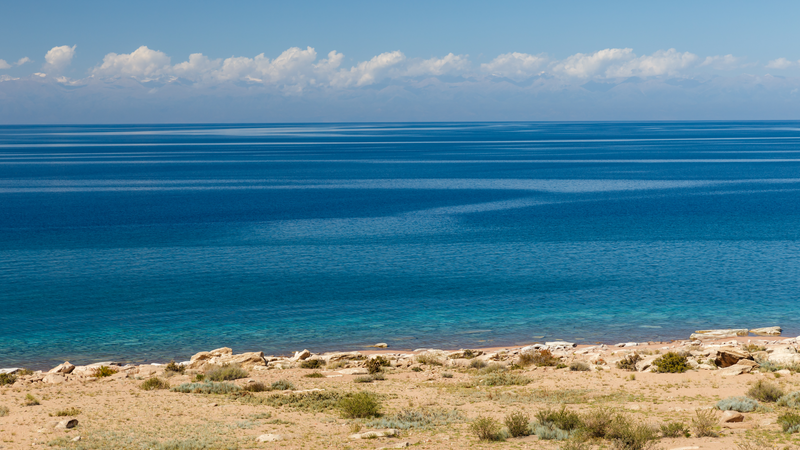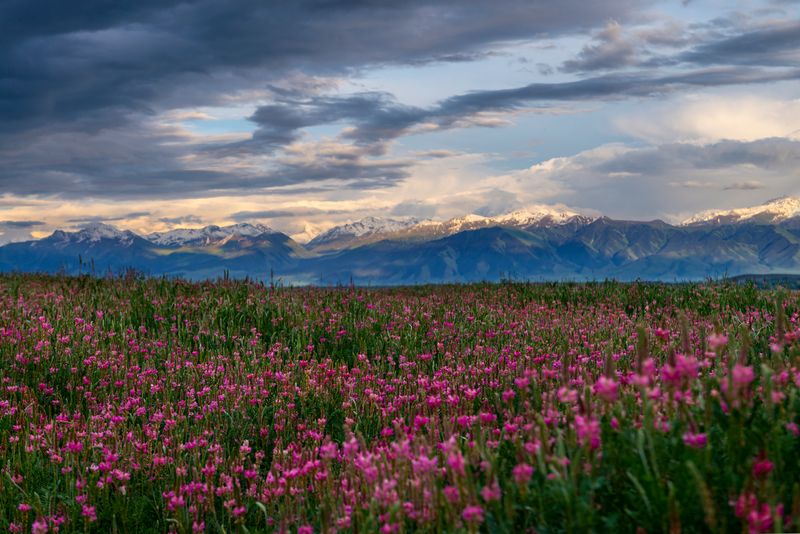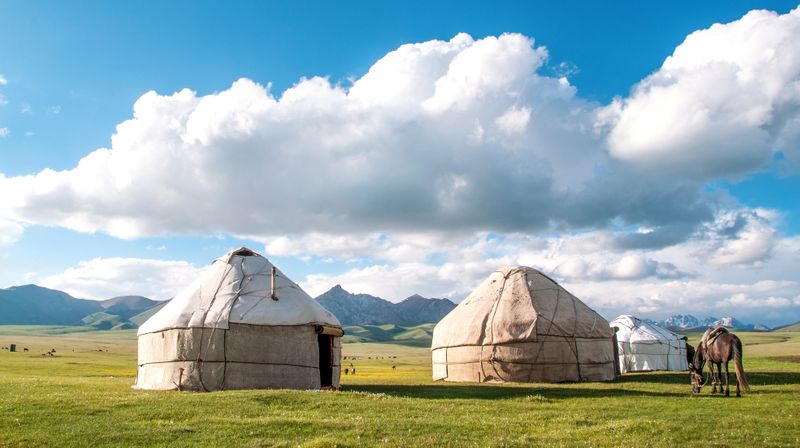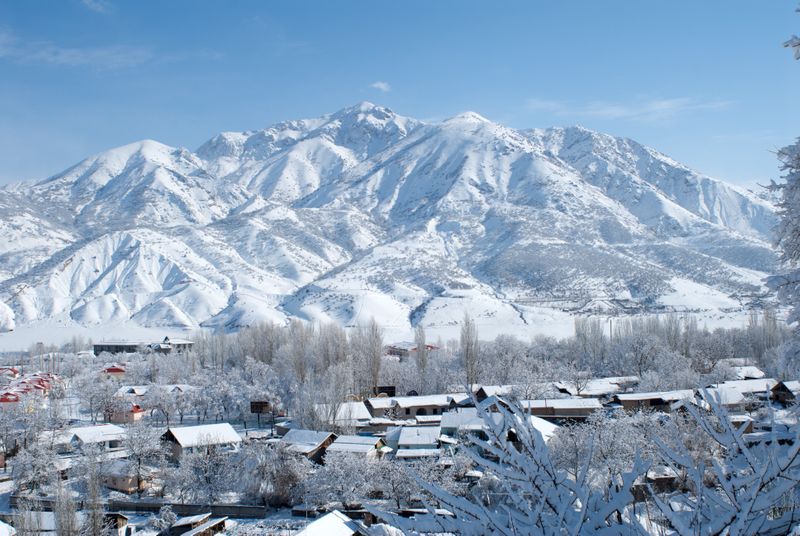Central Asia’s Stans—Uzbekistan, Kazakhstan, Kyrgyzstan, Tajikistan, and Turkmenistan—are countries with fascinating cultures, history, and natural beauty. But when should you visit? The best time to visit Central Asia largely depends on the type of experience you're looking for and the climate conditions, which can vary significantly. Central Asia has a continental climate with four distinct seasons, and with this in mind, you’ll be able to find a perfect season to suit you.
1. Spring in Central Asia: Blooming Landscapes & Festive Celebrations
Spring, from April to June, is an ideal time to travel to most regions. You can expect mild and pleasant temperatures throughout Central Asia, especially in countries with more mountainous terrain like Kyrgyzstan and Tajikistan. Daytime temperatures range from 15 to 25 degrees, perfect for outdoor activities like trekking and sightseeing. Spring in Kyrgyzstan and Tajikistan on the other hand offers ideal conditions for exploring these beautiful high-altitude areas.
The cooler, pleasant temperatures make trekking in places like Song-Kol Lake (Kyrgyzstan) and the Pamir Mountains (Tajikistan) much more enjoyable. Whether you’re trekking along alpine lakes or venturing into the mountain ranges, spring provides clear skies and views for days.
For those wanting to explore the ancient Silk Road cities and visit cultural sites like Samarkand, Bukhara, Khiva (Uzbekistan), and Ashgabat (Turkmenistan) will find the springtime temperatures most suitable as you’ll skip the intense heat of the summer. The conditions are ideal for wandering the ancient streets, exploring landmarks, and enjoying the outdoor markets without the heat. Spring is the best season for travel to the 5 Stans to trek Tian Shan mountains and visit Issyk-Kul Lake (both located in Kyrgyzstan).
As the landscapes bloom, spring also marks the start of the festival season across Central Asia. On March 21, Navruz Festival (or New Year in the Silk Road countries), is celebrated with music, dancing, and feasting on delicious traditional foods. In Uzbekistan, festivals like the Bukhara Silk and Spice Festival held in May, showcase traditional music, dance, and local food. This fun atmosphere makes spring an exciting time to visit. Visiting a destination during a special festival or cultural celebration makes for a memorable holiday, and Inspiring Vacations has plenty of exciting options.
With snowmelt feeding rivers and lakes, this season also brings a lush green to the region. The Tian Shan Mountains and Issyk-Kul Lake in Kyrgyzstan are beautiful at this time, and the trekking conditions are superb. Nature enthusiasts will love the season for hiking and even wildlife watching; photography is also great in the spring as the light enhances the already breathtaking scenes.
2. Summer in Central Asia: High Heat, Mountain Retreats
Summer temperatures in July and August, as expected, can be scorching hot, especially in the desert areas of Turkmenistan, Uzbekistan, and Kazakhstan, and can exceed 35 degrees, even reach up to 45°C (113°F) in places like Bukhara and Khiva. High-altitude regions like Tian Shan and the Pamir Mountains enjoy cooler temperatures and exploring alpine lakes like Song-Kol and Issyk Kul.
In Uzbekistan, touring the famous cities of Samarkand, Bukhara, and Khiva, and their ancient mosques, madrassas, and bazaars is doable during the day, and the summer evenings are ideal for walking around these historical cities as the heat tends to ease. In Kazakhstan, head to the cool Altai Mountains for hiking, and the tranquil shores of Lake Balkhash, bring pleasant temperatures in the evening.
For a summer experience to remember, head to Almaty’s nearby mountains for hiking, paragliding, and lush green valleys. Alternatively, enjoy a yurt stay by the cool waters of Issyk Kul Lake in Kyrgyzstan. Charyn Canyon National Park, also known as the ‘Grand Canyon of Kazakhstan’, offers incredible hiking opportunities and dramatic landscapes to enjoy during the summer months. On our 22 Day Five Stans Unveiled tour, the national park is visited on the way to Almaty.
The summer months also bring lively cultural celebrations in Kazakhstan’s cities, where locals gather for outdoor concerts and street festivals. In Tajikistan, the Fann Mountains offer excellent summer trekking with pleasant temperatures at higher elevations. The crystal-clear Iskanderkul Lake and the Pamir Mountains are perfect for a cool escape. In Turkmenistan, summer is intense so keeping activities to early mornings or late evenings is best. In the capital city of Ashgabat, its sprawling parks offer some respite from the desert heat, as do visiting attractions like the National Museum of Turkmenistan, the Turkmenbashi Ruhy Mosque, and the Independence Monument.
3. Autumn in Central Asia: Harvest Festivals & Vibrant Landscapes
When autumn hits, from September to October, so do the local festivals and harvest season, and the hiking and trekking trails get busy. Temperatures are moderate and the landscape is beautiful with autumn colours filling the valleys and mountains—it is one of the best times to explore Central Asia. Daytime sightseeing temperatures hover around 15 to 25°C (59 to 77°F), and alongside outdoor pursuits, the famous Silk Road festivals in Bukhara and Samarkand are the perfect addition to your must-do list.
Autumn also brings harvest feasts across Central Asia, where you can taste-test fresh fruit, nuts, and seasonal vegetables. On our 22 Day Five Stans Unveiled tour, you’ll get the opportunity to do this on a morning visit to the Green Bazaar, the oldest market in Kazakhstan. The Kazakh city of Almaty also plays host to a variety of autumn festivals and harvest markets, where fresh, local produce can be sampled and you can meet the growers. The Almaty Apple Festival, held over three days in September, is the most adored, celebrating all things apple-themed (including cider making!).
For adventure-seekers, hiking and trekking opportunities are particularly colourful during this time, especially around Kyrgyzstan’s Issyk Kul Lake, where the surrounding mountains are painted with reds, oranges and gold. Autumn is also the time for wildlife enthusiasts to visit as migrating birds and animals can be spotted in the region’s national parks.
In autumn, in particular, experiencing a stay at a yurt camp (like on this Five Stans tour) is the perfect opportunity to witness the region’s culture and hospitality in a beautiful setting. Similarly, in nearby Samarkand, the golden hues of autumn bring a striking contrast to the ancient architecture of Registan Square, making it an ideal time to explore this historic landmark.
4. Winter in Central Asia: Snowy Escapes & Cultural Highlights
In winter, November to March, the weather in Central Asia can be very cold, especially in high-altitude areas and it’s common for temperatures to drop below freezing. In Kazakhstan and Kyrgyzstan, winter temperatures in Almaty and Bishkek can dip below -10°C (14°F) and can plunge far lower in some parts of Kazakhstan. The weather in Central Asia by month can vary significantly, so be sure to check for any location-specific temperature fluctuations.
Winter sports enthusiasts will love the skiing and winter trekking options in the mountains. The ski season in Central Asia generally starts in late November, with resorts like Shymbulak in Kazakhstan and Jyrgalan in Kyrgyzstan offering fantastic skiing conditions and fewer crowds. Temperatures in Uzbekistan and Turkmenistan remain mild, but it can still be chilly in the evenings.
Tajikistan’s Pamir Mountains also offer adventurous and experienced visitors the chance to enjoy winter trekking in remote areas, although the cold can be extreme, so it’s not suited to beginners. Visiting major centres like Ashgabat and Samarkand without the crowds is pleasant, just remember to layer up for sightseeing and outdoor activities.
While temperatures in Uzbekistan and Turkmenistan remain milder than in the mountains, it’s still chilly, especially in the evenings. In Samarkand, Uzbekistan, the clear winter air offers a quieter and more peaceful time to visit the city’s ancient Silk Road sites, such as Registan Square without the usual crowds. Similarly, Ashgabat in Turkmenistan offers a calmer atmosphere for exploring everything the capital offers, including special winter-only activities and festivals.
A winter visit to the Darvaza Gas Crater, also known as Door to Hell, in Turkmenistan is especially memorable during the colder months. The chill in the air contrasts with the intense heat of the crater, creating a dramatic atmosphere. The evenings can be cold, but daytime temperatures remain relatively mild, making outdoor activities comfortable.
Winter is also an excellent time for those interested in cultural experiences. Visit local markets to try seasonal dishes and hot drinks. In Kazakhstan and Kyrgyzstan, you can enjoy hearty soups and stews, while in Uzbekistan and Turkmenistan, you can warm up with traditional tea and pilaf.
Essential Packing Tips for Each ‘Stan’ in Central Asia:
- Turkmenistan: In the summer months, Ashgabat and the desert regions can be extremely hot, so light clothing, sunscreen, and plenty of water are crucial. In winter, pack warm layers, as temperatures can drop in the evenings. Comfortable walking shoes are a must, especially when touring Ashgabat’s famous sites.
- Kazakhstan: Be prepared for extreme temperature fluctuations. In Almaty, winters can be cold, below -10°C (14°F), and summers can soar above 35°C (95°F). Pack layers of clothing, including a heavy coat for winter and lightweight clothing for the summer. For outdoor activities, comfortable shoes for hiking and trekking are essential.
- Kyrgyzstan: In spring and autumn, it’s best to pack layers as temperatures can vary widely, especially in mountainous regions. In summer, bring light clothing for the lowlands, but keep warmer gear for the mountains. Always pack sunscreen, as UV exposure is strong at high altitudes, and pack a good pair of hiking boots for trekking in areas like Song-Kol Lake.
- Tajikistan: Summer is hot in cities like Dushanbe, so pack light clothing, but if you're heading into the mountains, bring warm layers. A good quality water bottle, sunscreen, and sturdy hiking boots are also recommended for trekking in the Pamir Mountains.
- Uzbekistan: During the summer, pack light and breathable clothing for the hot desert climate. Bring a hat, sunglasses, and sunscreen to protect yourself from the harsh rays. For visits to historical sites like Samarkand or Bukhara, comfortable shoes for walking are important, as these areas are best explored on foot.
Central Asia really does have a season to suit everyone.
When will you go?
Inspired to travel to Central Asia? Our 22 Day Five Stans Unveiled tour takes in the exciting Turkmenistan capital city as well as Uzbekistan, Tajikistan, Kyrgyzstan and Kazakhstan. A tour option including Turkey is also available.



